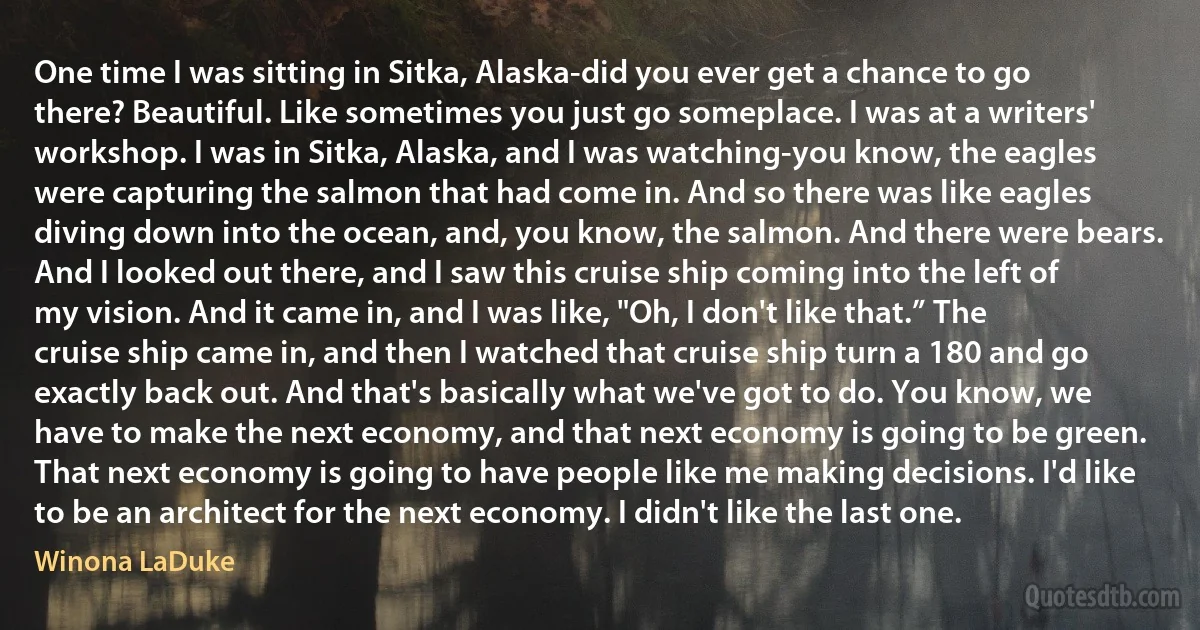
One time I was sitting in Sitka, Alaska-did you ever get a chance to go there? Beautiful. Like sometimes you just go someplace. I was at a writers' workshop. I was in Sitka, Alaska, and I was watching-you know, the eagles were capturing the salmon that had come in. And so there was like eagles diving down into the ocean, and, you know, the salmon. And there were bears. And I looked out there, and I saw this cruise ship coming into the left of my vision. And it came in, and I was like, "Oh, I don't like that.” The cruise ship came in, and then I watched that cruise ship turn a 180 and go exactly back out. And that's basically what we've got to do. You know, we have to make the next economy, and that next economy is going to be green. That next economy is going to have people like me making decisions. I'd like to be an architect for the next economy. I didn't like the last one.
Winona LaDukeRelated topics
beautiful came chance coming diving green last left making next ocean people saw ship sitting time turn vision 180 alaska someplace EaglesRelated quotes
The amazing part of the great Danish cartoon caper isn't that Muslims immediately engage in acts of mob violence when things don't go their way. That is de rigueur for the Religion of Peace. Their immediate response to all bad news is mass violence. That's a "dog bites man" story and belongs on page B-34, next to the grade school hot lunch menu and the birth notices. After an Egyptian ferry capsized recently, killing hundreds of passengers, a whole braying mob of passengers' relatives staged an organized attack on the company, throwing furniture out the window and burning the building to the ground. Witnesses say it was the most violent ocean liner-related incident since Carnival Cruise Lines fired Kathie Lee Gifford. The "offense to Islam" ruse is merely an excuse for Muslims to revert to their default mode: rioting and setting things on fire.

Ann Coulter
Colours no longer looked as brilliant to me as they use to do [Monet's sight was beginning to fail], I no longer painted shades of light so correctly. Reds looked muddy to me, pinks insipid, and the intermediate or lower notes in the colour scale escaped me. As for forms, I could see them as clear as ever, and render them as decisively. At first I tried pertinacity. How many times I have remained for hours near the little bridge, exactly were we are now, in the full glare of the sun, sitting on my camp-stool, under my sunshade, forcing myself to resume my interrupted task and to recapture the freshness my palette had lost! A waste of effort. What I painted was more and more mellow.... and (when) I compared it with what I used to do in the old days. I would fall into a frantic rage, and I slashed all my pictures with my penknife.

Claude Monet
the most remarkable piece of reading that you may be recommended to take and try if you can study is a book by Goethe-one of his last books, which he wrote when he was an old man, about seventy years of age-I think one of the most beautiful he ever wrote, full of mild wisdom, and which is found to be very touching by those who have eyes to discern and hearts to feel it. It is one of the pieces in "Wilhelm Meister's Travels." I read it through many years ago; and, of course, I had to read into it very hard when I was translating it (applause), and it has always dwelt in my mind as about the most remarkable bit of writing that I have known to be executed in these late centuries. I have often said, there are ten pages of that which, if ambition had been my only rule, I would rather have written than have written all the books that have appeared since I came into the world.

Thomas Carlyle
I, too, have made a wee-little book from the same materials, which I call the Philosophy of Jesus; it is a paradigma of his doctrines, made by cutting the texts out of the book, and arranging them on the pages of a blank book, in a certain order of time or subject. A more beautiful or precious morsel of ethics I have never seen; it is a document in proof that I am a real Christian, that is to say, a disciple of the doctrines of Jesus, very different from the Platonists, who call me infidel and themselves Christians and preachers of the gospel, while they draw all their characteristic dogmas from what its author never said nor saw. They have compounded from the heathen mysteries a system beyond the comprehension of man, of which the great reformer of the vicious ethics and deism of the Jews, were he to return on earth, would not recognize one feature.

Thomas Jefferson
The unremitting division of labour resulted in admirable levels of productivity. The company's success appeared to bear out the principles of efficiency laid down at the turn of the twentieth century by the Italian economist Vilfredo Pareto, who theorized that a society would grow wealthy to the extent that its members forfeited general knowledge in favour of fostering individual ability in narrowly constricted fields. In an ideal Paretan economy, jobs would be ever more finely subdivided to allow for the accumulation of complex skills, which would then be traded among workers. ... But however great the economic advantages of segmenting the elements of an afternoon's work into a range of forty-year-long careers, there was reason to wonder about the unintended side effects of doing so. In particular, one felt tempted to ask ... how meaningful the lives might feel as a result.

Alain de Botton
